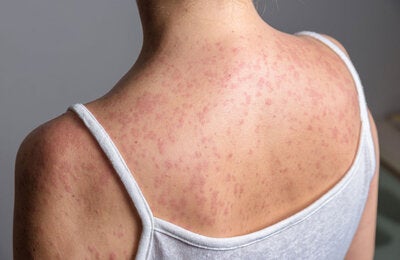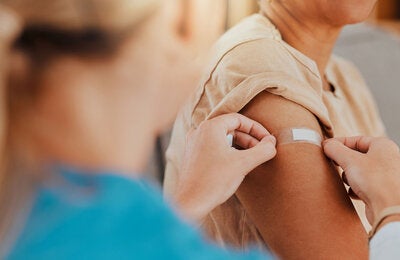

The Technical Advisory Group (TAG) of the Pan American Health Organization/World Health Organization (PAHO/WHO) on Vaccine-preventable Diseases has recommended that opportunities for collaboration between public vaccine producers in the Americas be explored with a view to incentivizing regional production in order to...
PAHO/WHO Technical Advisory Group on Vaccine-preventable Diseases makes recommendation in view of the challenge to guarantee a steady supply of priority vaccines and maintain achievements to dateWashington, DC, October 25, 2012 (PAHO/WHO)—The Technical Advisory Group (TAG) of the Pan American Health Organization/World Health Organization (PAHO/WHO) on Vaccine-preventable Diseases has recommended that opportunities for collaboration between public vaccine producers in the Americas be explored with a view to incentivizing regional production in order to meet local needs. This recommendation arises from the challenges currently being faced to guarantee a steady supply of priority vaccines and maintain the achievements to date in controlling and eradicating such diseases as poliomyelitis, measles, and rubella.
It would be desirable if the vaccines produced in Latin America were accessible to all the countries of the Region, said Dr. Ciro de Quadros, chairman of TAG. who presided over the meeting together with the Deputy Director of PAHO, Dr. Jon Andrus. De Quadros went on to note that the yellow fever vaccine produced by Brazil is the only one currently being used in other countries of Latin America.
To move forward on this road, the Technical Advisory Group recommended that PAHO/WHO convene a working group, bringing together representatives of public vaccine producers in Latin America and the Caribbean, to identify common areas of activity and draft a regional strategy for vaccine research, development, and production.
The use of high-quality, safe, and effective vaccines in national immunization programs has saved more than 2.5 million lives in Latin America and the Caribbean since 1974. The countries of the Region have also been successful in introducing new and/or improved vaccines that have helped to control a number of communicable diseases.
There are 40 vaccine providers in the world, 15 of which produce 95% of the total output, and 70% of vaccine production takes place in developing countries. In the Americas there are six public sector vaccine manufacturers, located in Argentina, Brazil, Colombia, Cuba, Mexico, and Venezuela.
The supply of traditional vaccines against polio, yellow fever, and whooping cough (also called pertussis), diphtheria, and tetanus continues to be erratic and often falls short of meeting the needs of the countries in the Region, which acquire them at an affordable price through the PAHO Revolving Fund. These vaccines are still essential. However, TAG noted in the conclusions of its meeting that they are no longer of commercial interest to the pharmaceutical companies, which in many cases have ceased to produce them or else have turned their interest toward the preparation of new combined vaccines.
Increasing the supply of traditional vaccines and making them more competitive in the new vaccine market would help to improve access to these products of pubic health interest.
The countries of the Americas have national regulatory authorities that are capable of monitoring vaccine quality, safety, and efficacy during the pre- and post-marketing phases. Vaccine production in both the public and private sectors has served to meet a sizable share of the demand within the countries. However, production capacity has not always been sufficient to meet the growing demand for the Region as a whole because in many cases the production volumes are only intended to meet national needs, with little possibility for export.
According to the conclusions of the meeting, the establishment of agreements for technology transfer between the transnational pharmaceutical industry and producers in the Region has not yet been translated into improved local capacity to produce new vaccines. Hence, there is need for more in-depth analysis of the role that regional producers can play in meeting the needs of the countries of the Americas for high-quality, safe, and effective vaccines.
The PAHO/WHO Technical Advisory Group on Vaccine-preventable Diseases met from October 17 to 19 in Washington, D.C., to examine current issues and make recommendations on vaccination against polio, rotavirus, whooping cough, measles, rubella, and cholera, as well as to consider prospects for ramping up regional vaccine production capacity.
The theme of the meeting of this year was "Paving the Way in Immunization," which refers to the pioneering role that PAHO/WHO has played in the control, elimination, and eradication of vaccine-preventable diseases and the introduction of vaccines. The countries of the Americas, through their own programs and using their own resources, have become world leaders in the elimination of vaccine-preventable diseases such as smallpox, poliomyelitis, measles, and rubella, and they have also pioneered the introduction of new vaccines, including vaccines against rotavirus, pneumococcus, and human papillomavirus (HPV).
PAHO, which celebrates its 110th anniversary this year, is the oldest international public health organization in the world. It works with its member countries to improve the health and the quality of life of the people of the Americas. It also serves as the Regional Office for the Americas of WHO.
Links:
- http://www.paho.org/paho110/
- http://www.paho.org
- https://www.facebook.com/PAHOWHO
- https://www.youtube.com/pahopin
- https://twitter.com/pahoeoc
- https://twitter.com/pahowho
- https://twitter.com/opsoms
Media Contacts:
Leticia Linn, linnl@paho.org, Tel. + 202 974 3440, Mobile +1 202 701 4005, Sebastián Oliel, oliels@paho.org, Phone +1 202 974 3459, Mobile 202 316 5679, Knowledge Management and Communications, PAHO/WHO—www.paho.org



